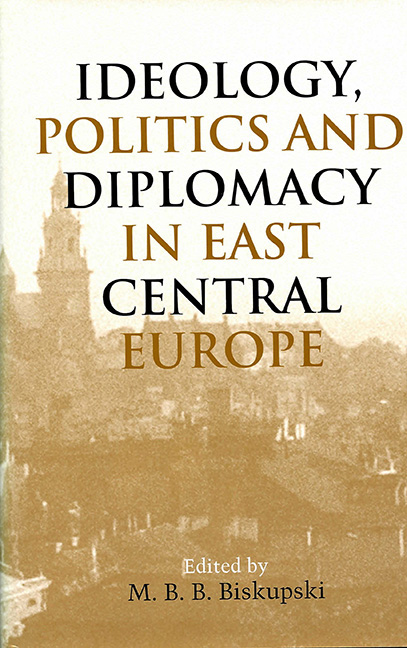Book contents
- Frontmatter
- Contents
- Preface
- Tabula Honoraria
- Piotr Wandycz
- Piotr Wandycz: An Appreciation
- 1 A Comparison of Czech Politics in Bohemia with Czech Politics in Moravia, 1860–1914
- 2 Strategy, Politics, and Suffering: The Wartime Relief of Belgium, Serbia, and Poland, 1914–1918
- 3 “This Troublesome Question”: The United States and the “Polish Pogroms” of 1918–1919
- 4 The Socialist Imprint on International Relations in Interwar Europe
- 5 Hungarian Americans during World War II: Their Role in Defending Hungary's Interests
- 6 The Nazi-Soviet Pact of August 23, 1939: When Did Stalin Decide to Align with Hitler, and Was Poland the Culprit?
- 7 Poland, the GDR, and the “Ulbricht Doctrine”
- Writings of Piotr S. Wandycz
- Contributors
- Index
2 - Strategy, Politics, and Suffering: The Wartime Relief of Belgium, Serbia, and Poland, 1914–1918
Published online by Cambridge University Press: 11 May 2017
- Frontmatter
- Contents
- Preface
- Tabula Honoraria
- Piotr Wandycz
- Piotr Wandycz: An Appreciation
- 1 A Comparison of Czech Politics in Bohemia with Czech Politics in Moravia, 1860–1914
- 2 Strategy, Politics, and Suffering: The Wartime Relief of Belgium, Serbia, and Poland, 1914–1918
- 3 “This Troublesome Question”: The United States and the “Polish Pogroms” of 1918–1919
- 4 The Socialist Imprint on International Relations in Interwar Europe
- 5 Hungarian Americans during World War II: Their Role in Defending Hungary's Interests
- 6 The Nazi-Soviet Pact of August 23, 1939: When Did Stalin Decide to Align with Hitler, and Was Poland the Culprit?
- 7 Poland, the GDR, and the “Ulbricht Doctrine”
- Writings of Piotr S. Wandycz
- Contributors
- Index
Summary
The history of the First World War presents a striking discrepancy between the magnitude, degree, and duration of suffering of European populations and the extent to which this suffering was addressed. Belgium, which sustained relatively few casualties and whose civilian population knew only brief privation, received enormous aid from both its allies and from such neutrals as the United States. By comparison, both Serbia and Poland, which endured years of the most abject misery and lost substantial portions of their population to hunger, exposure, and disease, received scant outside aid during the war. The relief of Belgium was not repeated in the east of Europe. Why this was true is the subject of this essay.
Relief for large, destitute populations was principally a question of food importation. Because European stocks were inadequate, and tended to fall during the War, this meant transatlantic shipment. Food, in effect, became a question of the Allied blockade. This, in turn, meant it was a problem for British rather than French, Italian, or Russian policy. As Paul Vincent has noted, London's allies’ “collective effect upon the functioning of the blockade was negligible. In general, one can assume that the blockade, as it existed between 1914 and 1917, was a British apparatus.”
The importation of transoceanic food into Europe was a strategic question of the greatest moment for the British, who were linked by what Avner Offer has called the “agrarian bond” to food exporting nations. Control of the channels of this food was perhaps London's greatest strategic concern during the war. As a result, relief issues raised fundamental questions about national and imperial security.
Along with the blockade, the United States, although neutral until 1917, was a factor of the greatest importance as regards international relief questions. The United States provided the majority of both the food and the money that relieved Europe during the war. Such organizations as the Rockefeller Foundation, the American Red Cross, and, of course, the Commission for Relief in Belgium were the principal agents either providing, or attempting to provide, wartime relief.
By comparison, the Central Powers, which had great and rising difficulties in feeding their own populations, were relatively passive agents in the question of international relief. Their principal role was to provide a justification—by requisitioning imported foods—for the British to refuse relief efforts.
- Type
- Chapter
- Information
- Ideology, Politics, and Diplomacy in East Central Europe , pp. 31 - 57Publisher: Boydell & BrewerPrint publication year: 2003



